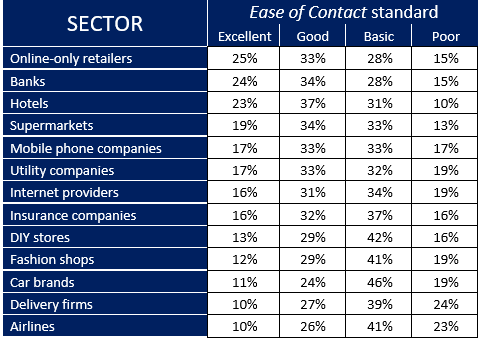The majority of sectors in the UK are falling well short of providing ‘excellent’ contactability to their customers and prospects, finds latest research, with airlines and delivery firms emerging as the worst culprits among a poor-performing group. These findings – conducted across a number of sectors including retail banks, hotels and supermarkets – are particularly astonishing in today’s connected world, where reputations are made and lost on internet reviews and competition across channels is increasingly fierce.
The research commissioned by Yonder Digital Group canvassed 1,000 UK consumers, asking whether they felt that companies in a range of sectors were easy to get in touch with and efficient at getting queries resolved rapidly and effectively. Today’s consumers are in fact increasingly accustomed to swift query response, across multiple channels, but the research results show that many sectors are failing to meet these taxing demands.
At the top end of the list, online-only retailers with no bricks and mortar presence at all, only scrimped a meagre 25% of consumers’ excellence; a particularly worrying result considering that shoppers don’t have the option of asking for assistance in-store. With previous Yonder research showing that 81% of consumers simply take their business elsewhere if their queries aren’t answered quickly and effectively by a company, it is highly risky for any business to continue overlooking their levels of ‘contactability’.

Chris Robinson, Yonder Digital Group CEO, comments, “Customers have individual preferences for contacting companies, which is why businesses lose out when they don’t offer a range of touch points. At crucial moments in the journey to purchase, many customers will look for a live agent, particularly for urgent or non-standard queries. Businesses that fail to provide support at these critical stages risk losing customers to competitors with superior support services. As the results show, a large proportion of companies are still falling well below the mark, suggesting there is a long way to go for UK industries to catch up with modern expectations.”